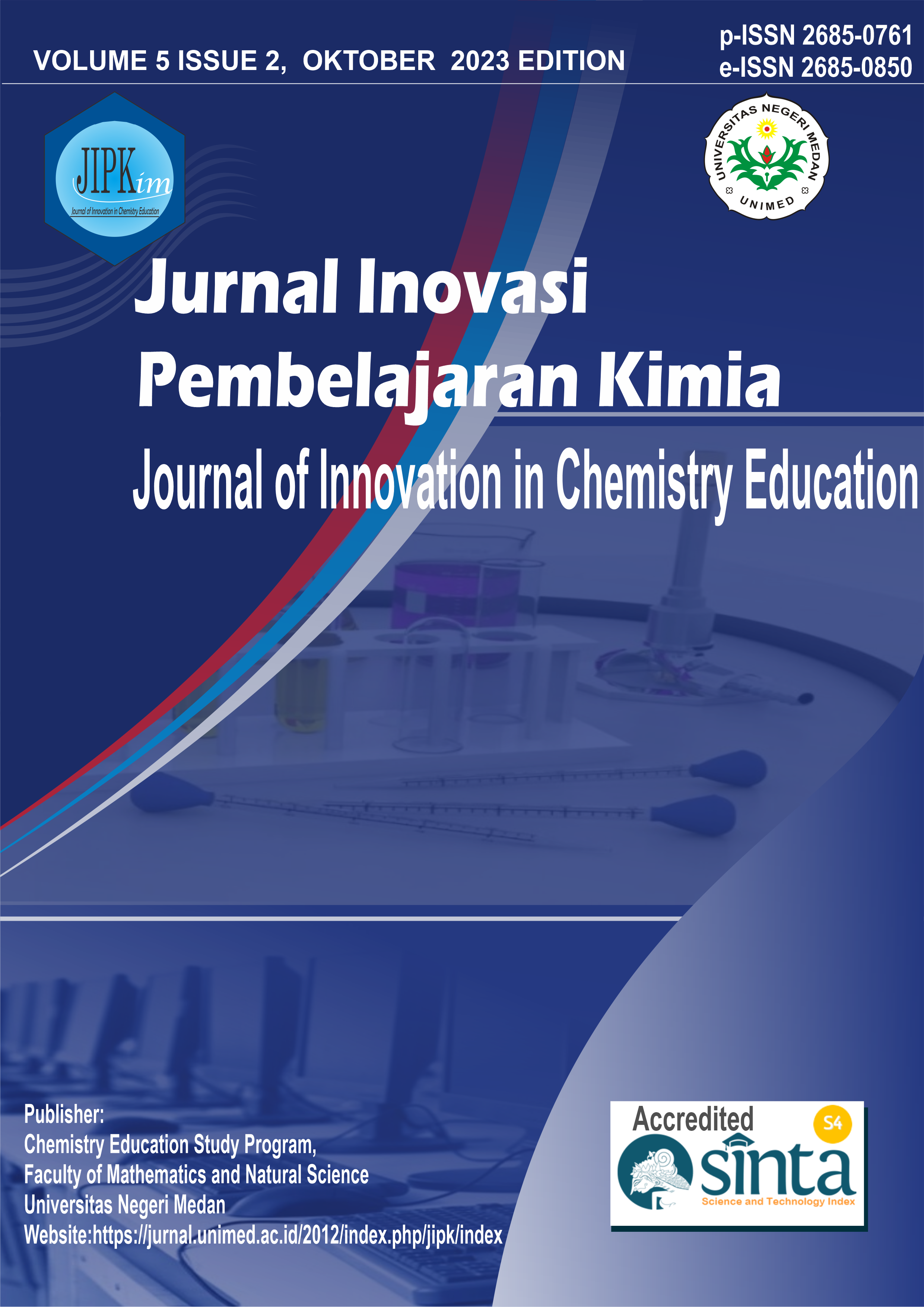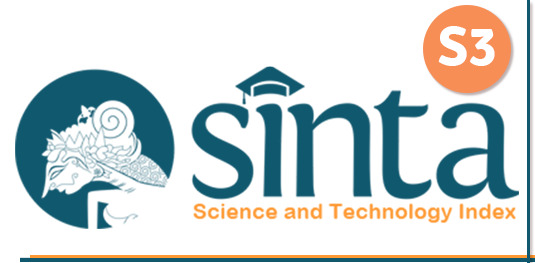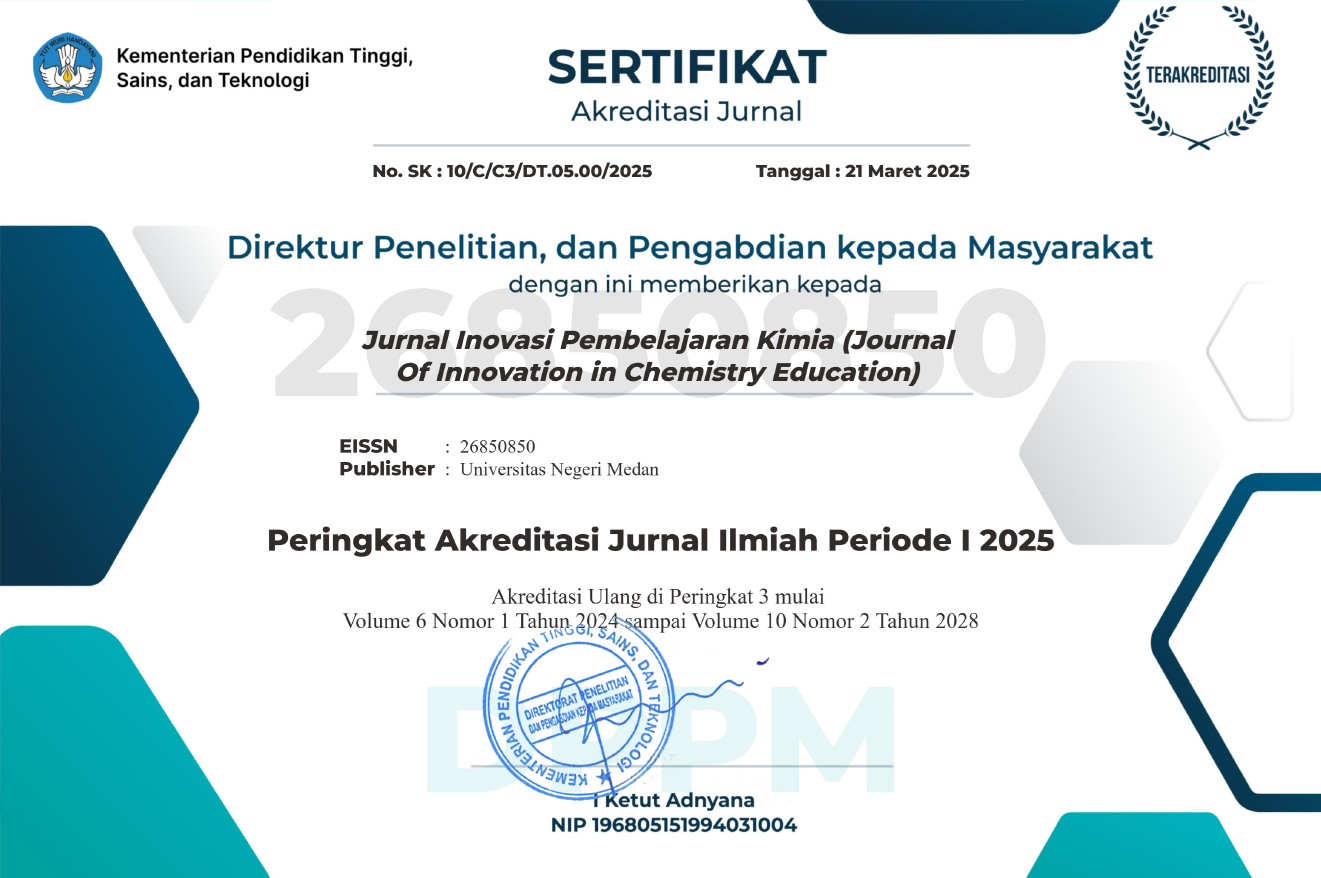The Effect of E-Module on Activity and Learning Outcomes on Electrolyte and Nonelectrolyte Solutions
DOI:
https://doi.org/10.24114/jipk.v5i2.54922Abstract
This research aims to determine activities, learning outcomes and the correlation between activities and student learning outcomes taught using the Project Based Learning (PjBL) learning model assisted by e-modules for class X SMA on electrolyte and non-electrolyte solutions. The population in this study were students of class This research uses test and non-test instruments in the form of student learning activity observation sheets which have been tested and are valid. The data obtained were tested for normality and homogeneity. Based on the results of data processing that has been analyzed, there are learning outcome values tcount = 9.714 and ttable = 1.66, the activity obtained is tcount = 6.069 and ttable = 1.66. Where tcount>ttable shows that Ha is accepted and H0 is rejected, so it can be concluded that there is an influence of the Project Based Learning (PjBL) learning model assisted by e-modules for class X SMA on electrolyte and non-electrolyte solutions. The correlation test was carried out to determine the significant correlation between activities and student learning outcomes. The research results show that rcount > rtable (0.929 > 0.329) so H0 is rejected. Thus, there is a significant correlation between activities and student learning outcomes assisted by e-modules for class X SMA on electrolyte and non-electrolyte solutions.References
Andini, L., & Azizah, U. (2021). Analisis Korelasi Keterampilan Metakognitif dan Minat Belajar terhadap Hasil Belajar Siswa pada Materi Kesetimbangan Kimia. Jurnal Kependidikan: Jurnal Hasil Penelitian Dan Kajian Kepustakaan Di Bidang Pendidikan, Pengajaran Dan Pembelajaran, 7(2), 472“480.
Eliyasni, R. (2019). Blended Learning and Project Based Learning: The Method to Improve Students™ Higher Order Thinking Skill (HOTS). Jurnal Iqra : Kajian Ilmu Pendidikan, 4(2), 231“248.
Jalinus, N., Nabawi, R. A., & Mardin, A. (2017). The Seven Steps of Project Based Learning Model to Enhance Productive Competences of Vocational Students. Advances in Social Science, Education and Humanities Research, 102, 251“256. https://doi.org/10.2991/ictvt-17.2017.43
Marpaung, C. P., & Suyanti, R. D. (2023). Improving Hots Literacy Using The PjBL Model with Crossword Puzzle Media on Reaction Rate Materials. Journal of Innovation in Chemistry Education, 5(1), 52“61.
Marto, H. (2021). Electronic Modul. National Seminar on Integrated Holistic ECCE Master of Non-Formal Education Postgraduate Gorontalo State University, 47“58.
Nurrita, T. (2018). Development of Learning Media to Improve Student Learning Outcomes. Misykat, 3(1), 171“187. https://doi.org/https://dx.doi.org/10.33511/misykat.v3i1.52
Prabawati, P. L. S., & Agustika, G. N. S. (2020). Project-Based Learning Based On Stem (Science, Technology, Engineering, And Mathematics) Enhancing Students Science Knowledge Competence. Jurnal Ilmiah Sekolah Dasar, 4(4), 621“629.
Purba, J., & Sembiring, B. A. (2023). Development of Project Based Learning Modules on The Subject of Chemical Equilibirium. Journal of Innovation in Chemistry Education, 5(1), 52“61.
Rostika, D. (2020). Application of the lSTAD type cooperative learning model to improve chemistry learning outcomes. Indonesian Journal Lof Educational Development, 1(2), 240“251.
Sappaile, B. I., Pritiwaluya, T., & Deviana, I. (2021). Hasil Belajar dari Perspektif Dukungan Orangtuan dan Minat Belajar Siswa. Global Research and Consulting Institute (Global-RCI).
Sardiman. (2016). Interaksi dan Motivasi Belajar-Mengajar. PT Raja Grafindo.
Sidiq, R., & Najuah. (2020). Development of Android-Based Interactive E-Modules in Teaching and Learning Strategy Courses. Journal of HISTORICAL EDUCATION, 1(9), 1“14.
Sihombing, I. S., & Sitorus, M. (2022). Pengembangan E-Modul Kimia Berbasis Proyek pada Materi Larutan Elektrolit dan Non Elektrolit. Educenter: Jurnal Ilmiah Pendidikan, 1(4), 306“315.
Simalango, M., & Situmorang, M. (2024). Project Based Learning Rosource Innovation to Build Students Critical Thinking Skill in Basic Teaching of Chromatography. Journal of Innovation in Chemistry Education, 5(2), 132“140.
Sinaga, M., & Silaban, S. (2020). Implementasi pembelajaran kontekstual untuk aktivitas dan hasil belajar kimia siswa. Gagasan Pendidikan Indonesia, 1(1), 33“40.
Sujana, A., Sopandi, W., & Sari, Y. N. I. (2020). Innovative Learning Models: Theory and Implementation. Rajawali Pers.
Syahril, Indrawan, E., & Jalinus, N. (2020). The Create Skill of Vocational Students to Design a Product: Comparison Project Based Learning Versus Cooperative Learning-Project Based Learning. In 5th UPI International Conference on Technical and Vocational Education and Training (ICTVET 2018), 316“320.
Utami, B., Agung, N., Lina, M., Sri, Y., & Bakti, M. (2009). Chemistry for SMA/MA X Class. Pusat Perbukuan.
Watoni, H. (2013). Kimia Untuk SMA Kelas X. CV. Yrama Widya.
Winatha, K. R., Suharsono, N., & Agustini, K. (2018). DEVELOPMENT OF PROJECT-BASED INTERACTIVE E-MODULES ON CLASS X DIGITAL SIMULATION SUBJECTS AT SMK IT BALI GLOBAL SINGARAJA. Indonesian Journal of Learning Technology, 8(1), 13“25.













